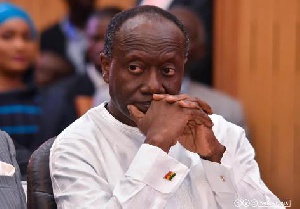The government’s reluctance to see to the passage of a Fiscal Responsibility Bill which will allow for the establishment of a Fiscal Council has created doubts about its commitment to maintain fiscal discipline in the medium to long-term. The enactment of a law and the creation of the council were stated in the New Patriotic Party’s (NPP) 2016 Manifesto.
Little progress, however, has been made towards the realisation of the law and council as the 2018 budget did not indicate the roadmap towards the implementation of the initiative this year. This situation, the IMANI Centre for Policy and Education, a think tank, finds worrying. At the launch of an assessment report, dubbed IMANIFESTO, on the first-year performance of the NPP government based on the promises in its Manifesto, the think tank expressed displeasure at the situation and questioned government’s resolve to implement policies that will promote fiscal discipline.
“Given that fiscal council is touted as the main institution to spearhead fiscal discipline in the country, it comes as a surprise that the government has made little progress towards establishing it in its first year. It is even more worrying that the government made no plans for it in the 2018 budget statement. Is the fiscal council no longer seen as an anchor for setting up and monitoring medium-term fiscal policy?” IMANI queried.
The government had planned to amend the Public Financial Management Act, 2016 (Act 921) to allow for the establishment of a Fiscal Council. The 2017 budget also captured the government’s intention to initiate processes for the establishment of such a council.
Ghana has suffered fiscal overruns consistently for years, raising concerns about introducing a control mechanism to checkmate the slippage. The establishment of a Fiscal Council was, therefore, to enhance fiscal discipline through the promotion of transparency, accountability and credibility in fiscal policy implementation. This was to be achieved through the strengthening of expenditure management, enhancing revenue mobilisation and ensuring effective debt management.
The Institute of Economic Affairs (IEA) had earlier mooted the passage of a Fiscal Responsibility Bill and the creation of a Fiscal Council. But the concept of a Fiscal Council gained prominence when Dr Mahamadu Bawumia, the Vice President, pointed to the absence of a fiscal law as one of the causes of the country’s consistent budget overruns at a public lecture in Accra in 2012. Now, as the Chairperson of the government’s Economic Management Team, Dr Bawumia, in July 2017, announced Cabinet’s approval of a Fiscal Responsibility Bill to be passed by Parliament to cap fiscal deficits to between three percent and five percent.
In the 2018 budget, however, Mr Ken Ofori-Atta, the Minister for Finance, indicated government’s commitment to address expenditure overruns by remaining committed to “continue with the implementation of the Public Financial Management (PFM) reforms with the aim of eliminating unproductive expenditure.”
Business News of Sunday, 28 January 2018
Source: goldstreetbusiness.com













